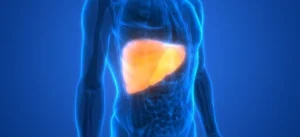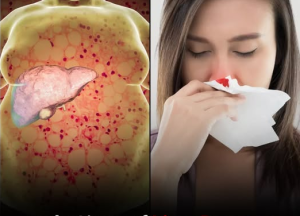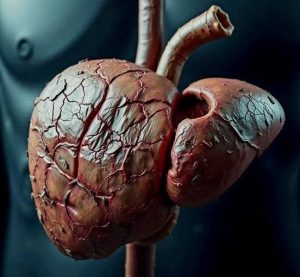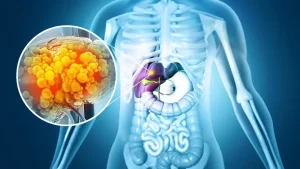The liver is one of the most vital and hardest-working organs in the body. The liver is about three pounds and is in the upper right part of your belly, directly below your rib cage. It does more than 500 critical things that you need to live. These include breaking down nutrients, getting rid of toxins, generating bile to assist digestion, and managing hormones and blood coagulation. People don’t pay much attention to their liver unless something goes wrong. Liver damage has often gotten worse by the time major symptoms show up. That’s why it’s so important to know the early signs of liver stress or dysfunction and to take care of your liver before it’s too late.
People often ignore chronic weariness, which is one of the most prevalent early signs of liver disease. This isn’t just being exhausted after a long day; it’s a deeper, longer-lasting exhaustion that doesn’t go away even when you get enough sleep. The liver is very important because it changes the food we eat into energy that we can utilize. If your liver isn’t performing effectively, it may not be able to create as much energy, which could make you feel tired. People often ignore or misdiagnose this form of weariness, but it could signal that the liver isn’t able to keep up with its cleaning demands.

Stomach ache is another clue that something is amiss. If your liver gets inflamed or bile flow is restricted, you could feel bloated, sick to your stomach, lose your appetite, or even feel full under your right rib cage. Bile is vital because it helps break down lipids and absorb vitamins A, D, E, and K, which dissolve in fat. You can feel gas, indigestion, or light-colored poop if your body doesn’t create enough bile. Some people may also find that fatty or fried foods suddenly make them feel ill or uncomfortable. Such soreness is generally a symptom that the body isn’t absorbing fats from food well.
If your skin, eyes, or urine change, it could mean that your liver isn’t working well. A frequent indication of jaundice is when the skin or whites of the eyes appear yellow. This symptom develops when the liver can’t break down and get rid of bilirubin, which is a yellow pigment that forms when red blood cells break down. Bilirubin builds up in the blood and shows up on portions of the body that can be seen. You might also notice that your urine is darker and your poop gets lighter or clay-colored. This change is due to differences in the amount of bilirubin and bile in your body.

Itchy skin is another sign that many people don’t notice. This isn’t just a little irritating; it happens all over the body, lasts a long time, and isn’t caused by skin conditions like eczema or allergies. Why? Bile salts and toxins can build up in the skin and make it itch if the liver doesn’t get rid of them well. Spider angiomas are blood vessels that look like spiders. They can also be an indication of hormonal imbalances caused by a liver that isn’t performing correctly. This is especially true for the face and chest. These often come with red palms (palmar erythema) or more bruises because the body doesn’t make enough proteins that help blood clot.
Sometimes, changes in your mental state can mean that your liver isn’t working right. If you’re confused, forgetful, irritable, or have brain fog, it could be because of hepatic encephalopathy. This happens when pollutants like ammonia build up in the blood and affect how the brain works. The liver normally gets rid of these poisons. This happens more often in adults with advanced liver disease, but mild cognitive issues can show up sooner than most people realize.

Some signs that liver damage may be becoming worse are losing weight without trying, losing muscle mass (particularly in the arms, legs, and face), and fluid building up in the abdomen (ascites) or legs (edema). These indicators usually suggest that the liver is getting worse and can’t break down nutrients or manage fluids as well as it used to. But again, these signs may not be very clear at first, so don’t ignore them.
The good news is that the liver is quite powerful and can fix cells that are injured if it gets the right treatment. That’s why you should always take care of your liver, no matter how old you are. Cutting down on things that stress or injure the liver, such alcohol, overly processed foods, trans fats, sugary drinks, and medicines that aren’t essential, is the first step. Taking too much of an over-the-counter medicine like acetaminophen (paracetamol) or drinking alcohol with it can hurt your liver. Your liver can also detox better if you cut down on the pollutants in your home, like those in plastics, cleaning supplies, and pesticides.
Your liver will be happy if you eat a lot of whole, unprocessed foods. Kale, arugula, and spinach are leafy greens that help the body get rid of toxins and bile. Cruciferous vegetables like broccoli, cabbage, and Brussels sprouts help the liver create more enzymes that help the body get rid of toxins. The sulfur compounds in garlic and onions help the liver create more glutathione, which is a powerful antioxidant. Researchers have shown that turmeric helps protect liver cells from damage because it is known to reduce inflammation. The fiber in whole grains, fruits, vegetables, and legumes helps the body get rid of waste faster, which makes the liver’s job easier.

Staying hydrated is another crucial but sometimes forgotten element of taking care of your liver. Water helps the liver filter out waste and maintains the blood flowing through it the right way. You should drink more than eight glasses of water a day if you work out a lot or live in a hot climate. Don’t drink too many sugary drinks, sodas, or caffeinated drinks because they could stress your liver over time.
It’s really important to keep your weight in check. A lot of fat in the stomach is a big risk factor for nonalcoholic fatty liver disease (NAFLD), which is a silent epidemic that affects millions of people throughout the world, even those who don’t drink alcohol. Your liver enzymes will get a lot better and your liver fat will go down if you drop even 5% to 10% of your body weight. Even merely walking, swimming, or bicycling on a regular basis can help your liver perform better, reduce inflammation, and make your body more sensitive to insulin.
People often forget how important sleep and stress management are when they talk about liver health. The liver accomplishes a lot of its repair and detox work as you sleep. Not getting enough sleep or sleep that isn’t good for you could throw off your hormones and make it harder for your liver to recover itself. Long-term stress can elevate cortisol levels, make inflammation worse, and injure the liver in an indirect way by making people do things that are bad for them, like eating when they’re upset or using drugs. Deep breathing, mindfulness, meditation, or yoga are all things that can help alleviate stress. These things are good for your liver and your health in general.
Your liver is the organ that cleans your blood, manages your energy, and speeds up your metabolism. It works all the time to keep you alive by cleaning your blood, changing your hormones, and making sure all of your body’s systems are working properly. When it’s under a lot of stress, it normally whispers first and then yells. You can keep your liver healthy and avoid getting sick later in life by paying attention to early signs of liver disorders and taking care of it with natural, long-lasting methods. Stopping something from happening is usually easier than fixing it. The activities you do now can have a big effect on the health of your liver in the future.
